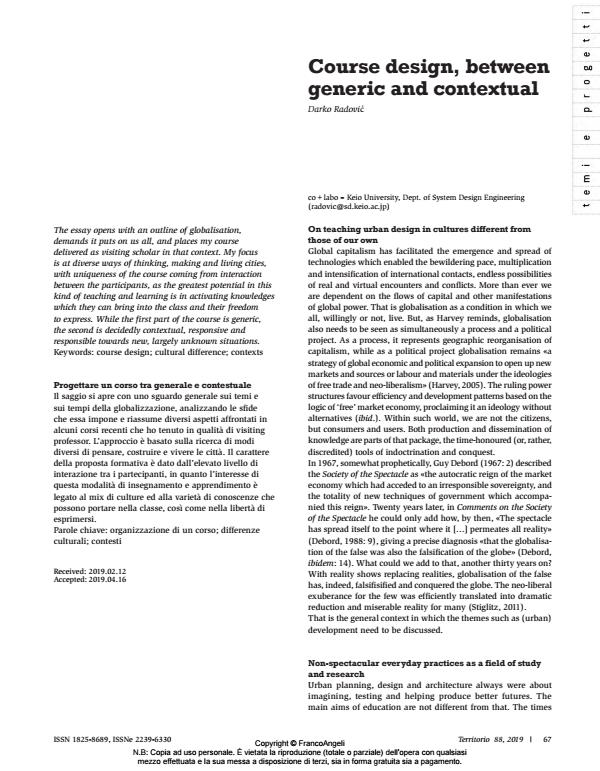Course design, between generic and contextual
Titolo Rivista TERRITORIO
Autori/Curatori Darko Radovic
Anno di pubblicazione 2019 Fascicolo 2019/88 Lingua Inglese
Numero pagine 5 P. 67-71 Dimensione file 572 KB
DOI 10.3280/TR2019-088010
Il DOI è il codice a barre della proprietà intellettuale: per saperne di più
clicca qui
Qui sotto puoi vedere in anteprima la prima pagina di questo articolo.
Se questo articolo ti interessa, lo puoi acquistare (e scaricare in formato pdf) seguendo le facili indicazioni per acquistare il download credit. Acquista Download Credits per scaricare questo Articolo in formato PDF

FrancoAngeli è membro della Publishers International Linking Association, Inc (PILA)associazione indipendente e non profit per facilitare (attraverso i servizi tecnologici implementati da CrossRef.org) l’accesso degli studiosi ai contenuti digitali nelle pubblicazioni professionali e scientifiche
The essay opens with an outline of globalisation, demands it puts on us all, and places my course delivered as visiting scholar in that context. My focus is at diverse ways of thinking, making and living cities, with uniqueness of the course coming from interaction between the participants, as the greatest potential in this kind of teaching and learning is in activating knowledges which they can bring into the class and their freedom to express. While the first part of the course is generic, the second is decidedly contextual, responsive and responsible towards new, largely unknown situations.
Progettare un corso tra generale e contestuale Il saggio si apre con uno sguardo generale sui temi e sui tempi della globalizzazione, analizzando le sfide che essa impone e riassume diversi aspetti affrontati in alcuni corsi recenti che ho tenuto in qualità di visiting professor. L’approccio è basato sulla ricerca di modi diversi di pensare, costruire e vivere le città. Il carattere della proposta formativa è dato dall’elevato livello di interazione tra i partecipanti, in quanto l’interesse di questa modalità di insegnamento e apprendimento è legato al mix di culture ed alla varietà di conoscenze che possono portare nella classe, così come nella libertà di esprimersi.
Keywords:Organizzazione di un corso; differenze culturali; contesti
- Adorno T., 1991, The Essay as Form. New York: Columbia University Press.
- Barthes R., 1970/1982, Empire of Signs. New York: Hill and Wang.
- Barthes R., 2011, The Preparation of the Novel. New York: Columbia University Press.
- Debord G., 1959, ≪Theory of derive≫. In: Knabb K., ed., Situationist International, anthology. Berkeley: Bureau of Public Secrets.
- Debord G., 1967/1994, The Society of the Spectacle. New York: Zone Books.
- Debord G., 1988/1998, Comments on the Society of the Spectacle. London: Verso.
- Harvey D., 2005, A Brief History of Neoliberalism. Oxford: Oxford University Press. Invisible Committee, 2009, The Coming Insurrection. Baltimore: Eigal Meirovich.
- Kuhn T., 1968/1996, The Structure of Scientific Revolutions. Chicago: University of Chicago Press.
- Lefebvre H., 1996, Writings on Cities. Cambridge, ma.: Blackwell.
- Manguel A., 2000, Reading Pictures; What We Think About When We Look at Art. New York: Random.
- Mason P., 2017, Postcapitalism: A Guide to Our Future. London: Penguin Books.
- Mitchell S.D., 2009, Unsimple Truth, Science, Complexity and Policy. Chicago-London: University of Chicago Press.
- Morozov E., 2013, To Save Everything, Click Here: The Folly of Technological Solutionism. New York: PublicAffairs.
- Radović D., 2008, Another Tokyo. Tokyo: The University of Tokyo-cSUR and ichii Shobou.
- Radović D., 2008a, ed., Eco-urbanity. Abingdon-New York: Routledge.
- Radović D., 2012, ≪The greatness of small≫. In: Viray E., Boontharm D., Hee L., eds, Future Asian space: projecting the urban space of new East Asia. Singapore: nus Press.
- Radović D., 2013, Intensities in The Cities. Tokyo: Flick Studio.
- Radović D., 2013a, Tokyo dérive: In Search of Urban Intensities. Tokyo: Flick Studio.
- Radović D., 2014, Subjectivities in Investigations of ‘the Urban’: the Scream, the Mirror, the Shadow. Tokyo: Flick Studio.
- Random M., 1987, Japan: Strategy of the Unseen. Northamptonshire: Crucible.
- Sheringham M., 2006, Everyday Life, Theories and Practices from Surrealism to the Present. Oxford: Oxford University Press.
- Stiglitz J., 2011, ≪Inequality and Economic Growth≫. -- https://onlinelibrary.wiley.com/doi/full/10.1111/1467-923X.12237 (accessed 7.1.2018).
Darko Radovic, Course design, between generic and contextual in "TERRITORIO" 88/2019, pp 67-71, DOI: 10.3280/TR2019-088010